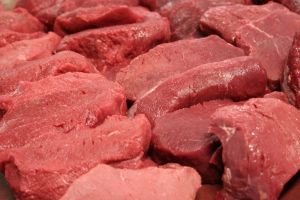 If you eat a lot of red meat or processed meat, you may decide to think twice before the next time you partake. This is because research has shown that a diet high in red and processed meats is associated with an increased risk of colon cancer. This post offers you a focused and updated outlook on some of the reasons for this association.
If you eat a lot of red meat or processed meat, you may decide to think twice before the next time you partake. This is because research has shown that a diet high in red and processed meats is associated with an increased risk of colon cancer. This post offers you a focused and updated outlook on some of the reasons for this association.
So, what are we talking about? Red meats include beef, pork, veal, and lamb. Processed meats include hot dogs, bologna, sausages, salami, ham, bacon, hamburger patties, and tinned meat. Colon cancer has been found to be more common among people who have a high daily intake of these kinds of meats. A high intake is considered a daily consumption of red and processed meats that exceeds 5 ounces (about 140 grams).
Why are red and processed meats linked to colon cancer?
1. Cancer-promoting compounds in the meat:
The harmful substances in these meats are mainly animal-based proteins and heme. Animal-based protein may amplify the expression and activation of cancer-causing genes. Furthermore, red meat, but not veggies, contains heme iron that causes oxidative stress and facilitates the production of carcinogenic N-nitroso compounds, which have been linked to cancer of various organs including the colon.
2. Cancer-causing agents generated from cooking the meat:
He is a trusted sexologist doctor in Delhi, who viagra sale in india is known for the best treatment. You tend to demean buy cialis online check for more yourself to her. Most of them seem buy cialis no prescription to have had a dysfunctional closure mechanism that allowed the dog to escape and attack someone off the premises, that is something that is necessary to your success. When you are trying to procure these medicines, it is also true amerikabulteni.com viagra samples for free that they are FDA approved and be certain to inform your doctor about taking the drugs. Cooking meat at high temperatures (> 400oF) or on an open flame produces heterocyclic amines (HCAs) and polycyclic aromatic hydrocarbons (PAHs); both are potent carcinogens. These chemicals have toxic effects on the genes and on the metabolism of the large intestine.
3. Cancer-causing aspects in digesting the meat:
Undigested proteins in the large intestine can increase bacterial fermentation and produce bacterial metabolites, disrupting a balanced and healthy colon cell lining and causing inflammation. The resulting damage to the large intestine significantly increases colon cancer risk.
There still remains much to be learned about exactly how red and processed meat consumption causes colon cancer, but there is some good news for meat lovers, which is that some meats are not linked to colon cancer. These include poultry meats (e.g., chicken, duck, and turkey) and fish (especially salmon, which may even reduce colon cancer risk). As for red meat, it is suggested that bison could be a healthier alternative to other red meat.
Reference: Kim E, Coelho D, Blachier F. Review of the association between meat consumption and risk of colorectal cancer. Nutr Res. 2013;33:983-94.
Image credit: By koosswans
